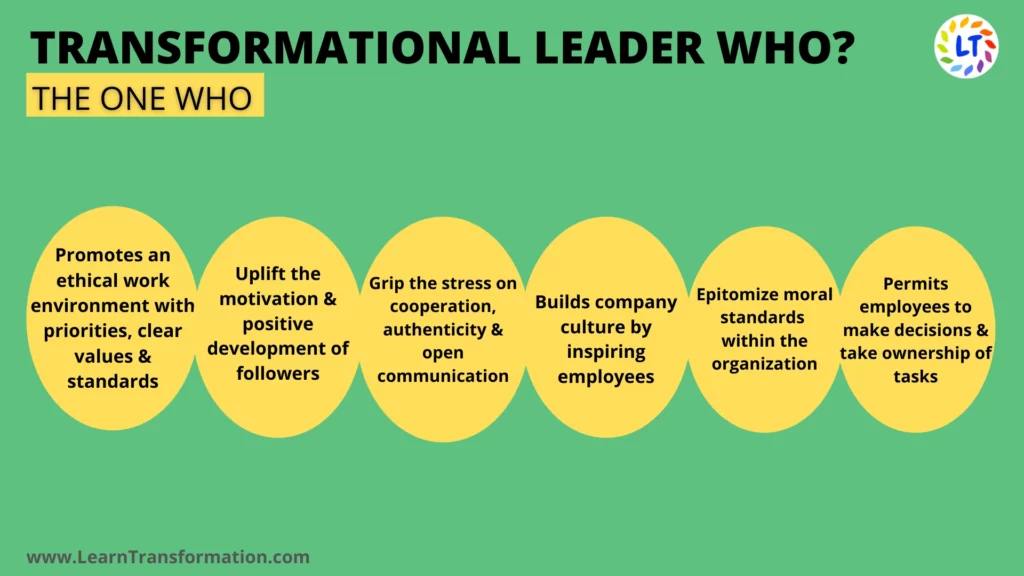Leadership is the capacity to translate vision into reality.
Warren Bennis
Transformational Leadership: Learn How to Lead with Impact
Transformational Leadership is a leadership style in which the leader uses his charisma & enthusiasm to influence his followers.
Everyone respects Sayra. Her team members are also, passionately loyal & they’re really successful – as individuals & as a team. By opposition, other leaders in the organization review that their people seem not involved. They encounter high employee resignation rate & their results are frequently saddening.
So, what does Sayra do that other leaders don’t? This is because, Sayra is a transformational leader & in this article, we’ll look at how you can be one, too.
- Transformational Leadership: Learn How to Lead with Impact
- What is Transformational Leadership?
- What are Transformational Leadership Characteristics?
- What is Transformational Leadership Model?
- How to be a Transformational Leader?
- What are Examples of Transformational Leaders?
- How VUCA contributes to transformational leadership?
What is Transformational Leadership?
Transformational leadership is a leadership style in which leaders inspire, encourage, & motivate employees to innovate and bring change that will help rise & frame the future success of the organization.
This kind of leaders amplify morale & motivation among followers. They are able to encourage them towards working for a collective good and far off working merely out of self-serving. And also, The impact of transformational leadership is advantageous for the followers & the organization itself.
Transformational leadership has a high payout as it positively affects innovation, the heart of success & growth within an organization. It also increases job performance & satisfaction too. Moreover, It is the management style which gives employees more space to be creative, look to the future & find new solutions to old problems.
Employees on the leadership track will also be prepared to become transformational leaders themselves through training & mentorship.
What are Transformational Leadership Characteristics?

So, A transformational leader is someone who:
- Epitomize moral standards within the organization.
- Grip the stress on cooperation, authenticity & open communication.
- Uplift the motivation & positive development of followers.
- Offers coaching & mentoring but permits employees to make decisions & take ownership of tasks.
- Promotes an ethical work environment with priorities, clear values as well as standards.
- Builds company culture by inspiring employees to switch from an attitude of self-serving to a mindset where they are working for the common good
What is Transformational Leadership Model?
The concept of transformational leadership began with James V. Downton in 1973 & was enlarged by James Burns in his 1978 book “Leadership”. He defined characteristics of transformational leadership as a process where “leaders & their followers uplift one another to higher levels of morality & motivation.”
Researcher Bernard M. Bass in 1985 further expanded the concept in his book, “Leadership and Performance Beyond Expectations,” to involve ways for estimating the success of transformational leadership. This model motivates leaders to reveal authentic & strong leadership with the intent that employees will follow them.
Bass’ model is till now a successful leadership style rehearsed today. This style of leadership never changes, just the environments it’s applied in. It’s applicable across every industry. But, it’s specially crucial to the fast-paced tech industry where innovation & agility can make or break a company during its leadership transformation process.
Read Also:- Decision Making & Problem Solving
Leader’s Tip:
Share a captivating vision, arouse enthusiasm, and give others the tools they need to realise their full potential.
How to be a Transformational Leader?
For bringing crucial changes, transformational leaders must manifest the following four factors:
1. Individualized Consideration-
- Leaders act as mentors to their followers & they also, reward them for creativity and innovation.
- Transformational leaders diligently work to know each of their followers as individuals. They give energetic feedback to mentor growth and development for effective leadership transformation.
- By acting as a mentor, leaders inspire employees & managers to support each other. That way, teams can share ideas & acknowledge unique contributions from each member of the group. So, The followers are treated separately according to their talents & knowledge. And also, They are authorized to make decisions & are always given with the required support to implement their decisions.
Also Read: 26 Best Leadership Books Of All Time
2. Intellectual Stimulation-
- “Transformational leaders inspire followers to innovate, to be creative & to shape new ideas for the organization and themselves. Moreover, They never condemn them publicly for the mistakes committed by them.
- The leaders concentrate on the “what” in problems and don’t focus on the blaming part of it. They don’t delay in getting rid of an old practice set by them if it is found unproductive.
- For example, leaders can create a work environment that’s more open & collective, which helps employees achieve new goals. Transformational leaders shake things up in order to get employees more involved & inspire them to come up with unique solutions to company challenges.
3. Inspirational Motivation-
- The base of transformational leadership is the encouragement of consistent mission, vision & a set of values to the members.
- Transformational leaders take time to understand where they are & where they are directed. Their vision is so riveting that they’re able to see the strengths & weaknesses of the entire organization and hold them to achieve company goals, leading to a better organization transformation. They work passionately, as well as optimistically also, to promote the spirit of teamwork & commitment.
- Besides, the leaders use motivational techniques like communicating transparently, setting a clear vision & recognizing accomplishment.
4. Idealized Influence-
- A leader can influence followers only when he practices what he preaches.
- Transformational leaders should incorporate focus & energy required to move forward & serve as a role model for the team. Leaders have considerable influence over the company culture so it’s important they present positive qualities that fit the organization’s values & goals. Hence, Such leaders always win the trust & respect of their followers through their action.
- They generally put their followers’ requirements over their own, sacrifice their personal gains for them, indicate high standards of ethical conduct, which is important for a better transformation of an organization.
Check out the Video-
What are Examples of Transformational Leaders?
It is expected that you can recognize the names of many of the famous transformational leaders that have made an impact on today’s society.
So, Some Well-known transformational leaders include:
- Abraham Lincoln.
- Nelson Mandela.
- Mahatma Gandhi.
- Richard Branson.
- Margaret Thatcher.
- Martin Luther King Jr.
- Indra Nooyi.
Harvard Business Review analyzed companies on the S&P and Fortune Global 500 list to uncover the best examples of transformational leadership.
- Tim Cook & Steve Jobs, Apple: Harvard Business Review points to Apple as an example of “dual transformation”: Jobs innovated on original Microsoft products while also developing a software ecosystem. Tim Cook has enlarged on Jobs’ vision, maintaining concentration on innovation, software & brand loyalty.
- Jeff Bezos, Amazon: HBR points to Bezos as someone who leaped from the finance world, he conducted a new outlook to e-commerce through years of experience in a various industry.
- Reed Hastings, Netflix: Hailing from the software industry, he wasn’t rooted in pre-established process & procedure in the television industry.
- Satya Nadella, Microsoft: Nadella started at Microsoft in 1992 and worked his way up the corporate ladder, in time running the business’ cloud computing efforts, which gave him the executive position.
- Emmanuel Faber, Danone: Faber started out as an architect for Danone & got the CEO job after he helped in developing the company’s vision to modify the company into a sustainable health & nutrition company.
How VUCA contributes to transformational leadership?
VUCA is a term that stands for volatility, uncertainty, complexity, and ambiguity. Further, These are the characteristics of the current business environment, which is constantly changing and unpredictable. Transformational leadership is a leadership style that emphasizes the importance of inspiring and motivating employees to achieve their full potential and transform the organization.
VUCA contributes to transformational leadership in several ways:
- Volatility: The volatile nature of the business environment requires leaders to be flexible and adaptable. Transformational leaders are able to adjust their strategies and tactics in response to changing circumstances, and to inspire their employees to do the same.
- Uncertainty: Uncertainty can lead to anxiety and confusion among employees. Transformational leaders are able to provide a sense of direction and purpose in uncertain times, and to inspire their employees to stay focused on the organization’s goals.
- Complexity: The complexity of the business environment requires leaders to be able to think critically and creatively. Transformational leaders are able to identify opportunities and challenges, and to develop innovative solutions to complex problems.
- Ambiguity: Ambiguity can lead to indecision and inaction. Transformational leaders are able to provide clarity and direction in ambiguous situations, and to inspire their employees to take decisive action.
In summary, VUCA contributes to transformational leadership by requiring leaders to be flexible, adaptable, innovative, and inspiring. In order to succeed in the current business environment, leaders must be able to navigate uncertainty, complexity, and ambiguity, and to inspire their employees to do the same.
Transformational leadership is an effective leadership style for achieving these goals, as it emphasizes the importance of empowering employees and creating a sense of purpose and direction within the organization.
Leader’s Tip:
Encourage people to think creatively and accept change by fostering a culture of innovation, cooperation, and ongoing learning.
Final Thought
At last, Learn Transformation thinks that, In today’s dynamic world, the only constant is change. To stay ahead, organizations need to have real-time access to Human Capital insights, experts & innovative technology solutions that are designed to not only drive, but sustain & extend organizational performance & involvement.
Frequently Asked Questions
What are the benefits of transformational leadership?
- Improved performance: Transformational leaders inspire and motivate their followers to achieve higher levels of performance and exceed expectations.
- Increased employee engagement: By creating a positive and inspiring work environment, transformational leaders foster high levels of employee engagement and commitment.
- Enhanced innovation and creativity: Transformational leaders encourage innovative thinking, risk-taking, and experimentation, leading to increased creativity and innovation within the organization.
- Development of future leaders: Transformational leaders invest in the growth and development of their followers, nurturing their leadership skills and grooming them for future leadership roles.
How does transformational leadership differ from other leadership styles?
- Transactional leadership: While transactional leaders focus on achieving goals through rewards and punishments, transformational leaders inspire and motivate their followers to go beyond their own self-interests and work towards a shared vision.
- Autocratic leadership: Autocratic leaders make decisions independently and exercise control over their followers, whereas transformational leaders involve and empower their followers, fostering collaboration and shared decision-making.
- Laissez-faire leadership: Laissez-faire leaders adopt a hands-off approach, providing little guidance or direction, whereas transformational leaders actively engage with their followers, provide support, and set clear expectations.
Key Takeaways
- Followers of transformational leaders are inspired and motivated to excel in performance and develop personally.
- Transformational leaders have traits like idealised influence, intellectual stimulation, inspirational motivation, and individual consideration.
- Organisational performance, employee engagement, innovation, and leadership development are all improved through transformational leadership.

